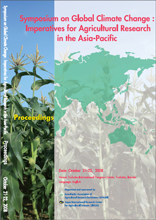Sustaining the Productivity and Competitiveness of the Agriculture, Forestry & Natural Resources Sector Amidst Global Climate Change: R&D Strategies of the Philippines

An elevated concentration of greenhouse gases in the atmosphere has altered the world’s climate
and in the Philippines, this has increased climate-related disasters such as droughts, forest fires,
landslides and floods which in turn have negatively impacted the agriculture, forestry and natural
resources (AFNR) sector. Severe droughts in 1997 to 1998 affected 960,000 hectares of agricultural
lands in 18 provinces resulting in damage estimated at P12 billion for rice and corn. Total fisheries
production dropped 10.2% - a lost value of P7.2 billion. On the other extreme, from 2000 to mid-2008,
tropical cyclones have resulted in damage averaging about P4 billion annually.
The fourth assessment report of the Intergovernmental Panel on Climate Change projected a
0.720C to 3.920C increase in temperature and ?2% to 12% change in precipitation for Southeast Asia
between 2010 and 2099. Should these projections become a reality, numerous damaging impacts are to
be expected by the AFNR sector. Expected impacts include extinction of 20-30% of plants and
animals, which are the backbone of the AFNR sector, and destruction of major agricultural crops,
livestock, fisheries and watersheds in and adjacent to erosion-prone areas. To address these specific
impacts, the Philippine Council for Agriculture, Forestry and Natural Resources Research and
Development (PCARRD) is implementing a science and technology (S&T) program on global climate
change for the AFNR sector.
The overall objective of the Council’s S&T program is to contribute to meet international and
national goals on poverty alleviation, food sufficiency, global competitiveness, and environmental
sustainability. Toward these goals, the program aims to bring cheaper food on Filipino tables,
implement aggressive programs for competitive agricultural products, implement initiatives for
sustainable environment and support the AFNR industries. An S&T program is implemented through
strategies on policy advocacy, capacity building, technology transfer and research and development
(R&D).
PCARRD’s R&D activities on global climate change seek to sustain the productivity and
competitiveness of the AFNR sector amidst global warming. These activities cover two areas:
assessment of vulnerabilities and impacts of global warming, and development of strategies for
adaptation and mitigation. In addressing these areas, the Council consequently will generate two major
products: agricultural and natural resources management systems adapted to climate change, and
adaptation strategies for sustainable development. In the long run, these outputs will contribute to
minimizing GHG emission from agriculture and forestry activities.
Using specific environmental indicators, we have identified priority areas for developing
measures to help the AFNR sector become more resilient to climate extremes. The R&D priorities
under these areas include: determining local vulnerabilities to and impacts from events related to
extreme climate; developing more efficient and effective disaster/hazard management; advancing
appropriate water and soil/watershed conservation; enhancing indigenous genetic conservation,
maintenance, improvement, and utilization; advancing integrated pest management; sustaining feed
production and preservation; upgrading production systems; enhancing techniques for carbon
sequestration and for GHG emission reduction; developing new biofuels; improving knowledge and
information management; and formulating science-based policies on global climate change impacts,
adaptation and vulnerability.
Presently, PCARRD is supporting long-term ongoing R&D programs on generating a
sustainable supply of raw material to produce environment-friendly, alternative energy from Jatropha, cassava, sweet sorghum and agricultural wastes. Furthermore, we envisage for 2009 and beyond, the
following major R&D programs on global climate change adaptation for the AFNR sector:
1. Climate change impacts and adaptation strategies on natural resources, agricultural and rural
communities in the Philippines. This will help provide the basis in formulating strategies and
developing mitigating measures to address the impacts of global climate change at the
community level.
2. Promotion of the use of compost and organic fertilizer. This program aims to promote the
use of agricultural wastes for increased agricultural production, thus preventing the release of
carbon into the atmosphere from the traditional practice of burning such wastes.
3. Carbon sequestration valuation of different vegetation types in the Philippines. This project
shall set the basis for valuating the amount of carbon stored and sequestered by secondary
growth, mossy, mangrove, and plantation forests in the country. It will also set the baseline
for the future participation of the country in carbon stocks trading.
4. Carbon stocks trading localization: Developing models for community-based carbon
sequestration and carbon trading mechanisms. The project will lay the foundation for
community participation in carbon trading under the Clean Development Mechanism. This
will particularly revolve around the current Community-Based Forestry Management
program by the Department of Environment and Natural Resources.
5. National watershed management R&D program. This program will (a) establish permanent
sites within priority sub-watershed in different regions, (b) conduct standardized research on
climate, biophysical, social and institutional influences, and (c) develop, validate, and
promote technologies for a more effective and efficient watershed management.
6. Policy advocacy support to streamlining global climate change policy in the Philippines. This
initiative targets the enhancement of global climate change knowledge and/or awareness of
the people through the (a) conduct of fora, seminars and symposia on climate change, (b)
production of information, education and communication materials and (c) policy advocacy
specifically in consolidating and formulating policies related to addressing climate change in
the country.
| 刊行年月日 | |
|---|---|
| 作成者 | Patricio S. Faylon Anthony M. Foronda |
| 著者キーワード |
Global climate change vulnerability and impact assessment adaptation and mitigation strategies sustainable development agriculture and forestry |
| 公開者 | Japan International Research Center for Agricultural Sciences |
| オンライン掲載日 | |
| 号 | 2008 |
| 開始ページ | 92 |
| 終了ページ | 100 |
| 権利 | Japan International Research Center for Agricultural Sciences |
| 言語 | eng |
